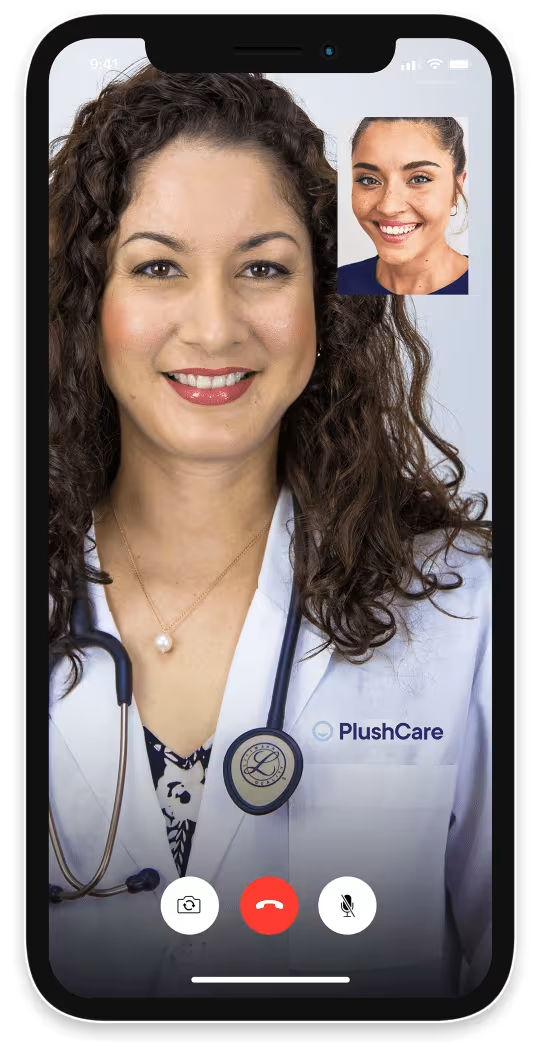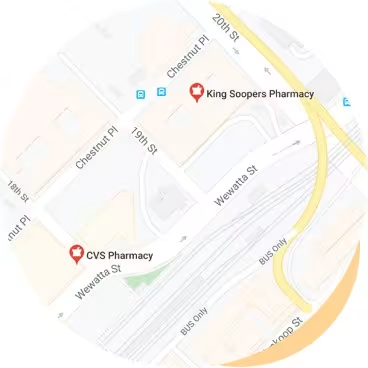- Mental Health
- Anxiety
Obsessive-Compulsive Disorder (OCD)
Online OCD treatment and medication prescriptions available today
In order to treat your obsessive-compulsive disorder (OCD), consult with one of our board-certified doctors online today to discuss treatment plans and prescribe medications to get relief from OCD symptoms. Get a new prescription to treat OCD or refill an existing prescription today.*
Book an appointmentRegain control with personalized OCD treatment
Same-day appointments to evaluate OCD symptoms
Find relief: Explore OCD treatment and medication options
*Prescriptions are provided at the doctor's discretion. Learn more about our controlled substances policy and how to save up to 80% with our prescription discount card. PlushCare doctors cannot treat all cases of OCD. Our primary care physicians can conduct an initial evaluation of your symptoms but may need to refer you to a specialist or for in-person treatment. If you are experiencing life-threatening symptoms, seek emergency medical attention immediately.

Learn about obsessive-compulsive disorder (OCD)
Obsessive-compulsive disorder, or OCD, is a mental health condition that causes sufferers to experience persistent and intrusive thoughts (obsessions) that lead them to perform repetitive behaviors (compulsions) repeatedly.
Obsessions: These are intrusive, unwanted, thoughts, images, or urges that trigger intensely distressing emotions.
Compulsions: These are repetitive actions or thoughts that a person uses hoping to get rid of the obsessions.
People with OCD often recognize that their obsessions are irrational, but they feel powerless in stopping them. This can lead to significant distress and disruption in their everyday life.
Obsessive Compulsive Disorder (OCD) causes
OCD is a serious mental health disorder that can cause significant problems in a person’s life. It is estimated that OCD affects about one percent of the population. While there is no single cause of OCD, several risk factors have been identified:
Genetics: There is evidence that OCD can run in families, which suggests that there may be a genetic component to the disorder. Those families with a history of OCD are more likely to have family members who develop the condition.
Brain abnormalities: Studies have shown differences in the brain structure of those with OCD compared to those without the disorder. These differences may result from a chemical imbalance or other brain abnormality.
Environmental factors: Certain life experiences, such as trauma or stress, can trigger OCD in those who are predisposed to the disorder. These conditions can cause the onset of OCD or make existing symptoms worse.
While the exact cause of OCD is not known, these risk factors provide a better understanding towards managing OCD.
OCD symptoms
According to the International OCD Foundation, there are a few common obsessions that will drive the compulsions (actions that manifest as symptoms) for people suffering from OCD:
Perfectionism-related obsessions: excessive concerns about making mistakes or performing tasks perfectly
Responsibility obsessions: excessive concerns about being responsible for something terrible (e.g. car accident)
Contamination obsessions: excessive concerns about coming into contact with perceived contaminated things
Religious/moral obsessions: excessive concerns about offending a higher power and right vs. wrong
Sexual obsessions: unwanted thoughts or mental images related to sex
As a result of the obsessions, OCD sufferers respond with compulsions which manifest as observable symptoms in daily life, including:Excessive hand-washing
Excessive counting
Excessive checking on things
Preoccupation with body appearance
People with OCD often recognize that their thoughts and behaviors are irrational, but they feel unable to control them. This can lead to a great deal of shame and embarrassment, making it difficult for people with OCD to seek help. As a result, another symptom is that some people tend to avoid situations or objects that trigger the obsessions.

How to treat OCD
If you think you might have OCD, it's important to seek professional help from treatment providers. A mental health professional can help you understand your thoughts and feelings and develop a treatment plan for OCD and related disorders.
There are two main types of treatment for OCD:
Medication: Antidepressants are often used to treat OCD, such as selective serotonin reuptake inhibitors (SSRIs). They help to reduce the symptoms of OCD, but they are not a cure.
Therapy: Cognitive behavioral therapy (CBT) is a type of therapy that can be very effective for OCD. It helps you change the way you think about and respond to your obsessions and compulsions. You work with a mental health professional to identify and challenge the thoughts that are causing your OCD. You also learn how to resist the urge to perform compulsions.
OCD medications
A combination of medication and therapy is the most effective treatment combination. There are a few different types of OCD medications for doctors to prescribe to their patients, and how they work can vary.
Selective serotonin reuptake inhibitors (SSRIs)
This is the most common medication prescribed to treat OCD. SSRIs help increase serotonin levels in the brain, which can help improve mood and reduce anxiety.
Tricyclic antidepressants
Antipsychotics
Benzodiazepines
*Note that these are a controlled substance, which we do not prescribe. Learn more about our controlled substances policy.

How to prevent OCD
There are many ways that people can develop OCD, however, there's no sure way to avoid OCD. However, there are some things you can do to improve your lifestyle and better manage OCD:
Live a healthy lifestyle: Get enough sleep, exercise regularly, and eat a nutritious diet.
Avoid drugs and alcohol: These substances can increase your risk of developing OCD or make your symptoms worse.
Try not to worry about things beyond your control: This can lead to anxiety and stress.
Focus on the present moment and hope as much as possible: Don't dwell on past mistakes or worry about future events.
Talk to someone if you're feeling stressed or anxious to get support: A therapist can help a patient learn how to manage anxiety or enroll in a support program to cope with OCD.
Join community support groups: In these groups, you will be able to share and learn from people also suffering from OCD under a supportive atmosphere. You can join in person or via online communities.
Remember, OCD is a mental illness that can be extremely debilitating. But with treatment, self-care, and support, it is possible to manage your symptoms and live a happy, healthy life.

When to see a doctor for OCD
If you have persistent and intrusive thoughts that are causing you distress, it's important to seek professional help. A doctor can rule out other conditions with similar symptoms and provide you with a diagnosis and treatment plan.
There are many different types of OCD, so it's important to see a doctor or therapist who is familiar with the disorder. If you're not sure whether you have OCD, consider talking to a mental health professional or therapist. They can help you understand your symptoms and formulate a diagnosis.
OCD Treatment FAQs
What are the symptoms of OCD?
Obsessions are recurring and persistent thoughts, impulses, or images that are intrusive and cause distress or anxiety. Compulsions are repetitive behaviors that the person feels compelled to do to relieve the anxiety caused by the obsessions. As a result of the obsessions, those diagnosed with OCD respond with compulsions, which manifest as observable symptoms, including:
Excessive checking on things
Excessive hand-washing
Excessive counting
Preoccupation with body appearance
What is the best treatment OCD?
There is no one-size-fits-all answer to this question, as the best treatment for OCD will depend on the person. However, the most effective treatments for OCD are typically a combination of medication and cognitive behavioral therapy (CBT).
OCD is typically treated with a selective serotonin reuptake inhibitor (SSRI), a type of antidepressant often used to treat depression. Common prescriptions include fluoxetine (Prozac), paroxetine (Paxil, Pexeva), clomipramine (Anafranil), fluvoxamine, and sertraline (Zoloft).
You can get OCD treatment online following an evaluation with a board certified doctor. During the online treatment session, you can discuss getting a sertraline (Zoloft) prescription online.
For therapy, you can book online therapy sessions through PlushCare to talk to licensed online therapists.Does therapy work for OCD?
Besides medication, therapy can also be very helpful for people with OCD. A combination of the two generally leads to the best results. Studies have shown that psychotherapy such as cognitive behavior therapy (CBT) and other related therapies (habit reversal training) can be very helpful. Exposure and response prevention (ERP) is a specific type of CBT that is particularly effective in treating OCD.
You can book online therapy sessions through PlushCare to talk to licensed online therapists.How can I find out if I should see a doctor for OCD?
If you are experiencing symptoms of OCD, it is important to see a mental health professional for an evaluation. A doctor or mental health professional can perform a diagnostic assessment to determine whether you have OCD or another disorder.
3 simple steps to get treated for obsessive-compulsive disorder today

Step 1
Book an OCD treatment appointment.
Book a same day appointment from anywhere.

Step 2
Talk to your medical provider regarding your OCD symptoms.
Visit with a doctor on your smartphone or computer.

Step 3
Pick up a prescription for OCD.
We can send prescriptions to any local pharmacy.
Related conditions to OCD
Body dysmorphic disorder
Anxiety disorder
Trichotillomania
Hoarding disorder
Excoriation disorder
Skin picking disorder
Obsessive-compulsive disorder treatment pricing details
How pricing works
To request OCD treatment and get a new prescription or refill on your prescription, join our monthly membership and get discounted visits.
Paying with insurance
Membership
$16.99/month
First month free
Visits
Copay
30 days of free membership
Same-day appointments 7 days a week
Unlimited messages with your Care Team
Prescription discount card to save up to 80%
Exclusive discounts on lab tests
Free memberships for your family
Cancel anytime
Visit price with insurance
Often the same as an office visit. Most patients with in-network insurance pay $30 or less!
We accept these insurance plans and many more:
Paying without insurance
Membership
$16.99/month
First month free
Visits
$129
30 days of free membership
Same-day appointments 7 days a week
Unlimited messages with your Care Team
Prescription discount card to save up to 80%
Exclusive discounts on lab tests
Free memberships for your family
Cancel anytime
Visit price without insurance
Initial visits are $129.
If we're unable to treat you, we'll provide a full refund.
OCD treatment resources:
Sources:
PlushCare is dedicated to providing you with accurate and trustworthy health information
Mayo Clinic. "Obsessive-Compulsive Disorder (OCD) - Symptoms and Causes." Mayo Clinic, Mayo Foundation for Medical Education and Research, Accessed October 16, 2023, https://www.mayoclinic.org/diseases-conditions/obsessive-compulsive-disorder/symptoms-causes/syc-20354432
International OCD Foundation. "About OCD." International OCD Foundation, Accessed October 16, 2023, https://iocdf.org/about-ocd/
American Psychiatric Association. "What Is Obsessive-Compulsive Disorder?" Psychiatry.org, American Psychiatric Association, Accessed October 16, 2023, https://www.psychiatry.org/patients-families/obsessive-compulsive-disorder/what-is-obsessive-compulsive-disorder
Mind. "Obsessive-Compulsive Disorder (OCD) - About OCD." Mind, Mind Infoline, Accessed October 16, 2023, https://www.mind.org.uk/information-support/types-of-mental-health-problems/obsessive-compulsive-disorder-ocd/about-ocd/
PlushCare content is reviewed by MDs, PhDs, NPs, nutritionists, and other healthcare professionals. Learn more about our editorial standards and meet the medical team. The PlushCare site or any linked materials are not intended and should not be construed as medical advice, nor is the information a substitute for professional medical expertise or treatment.